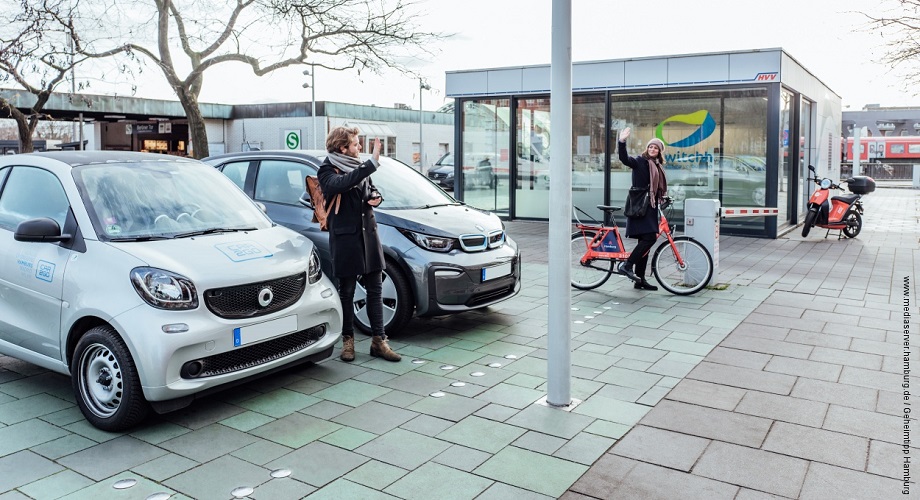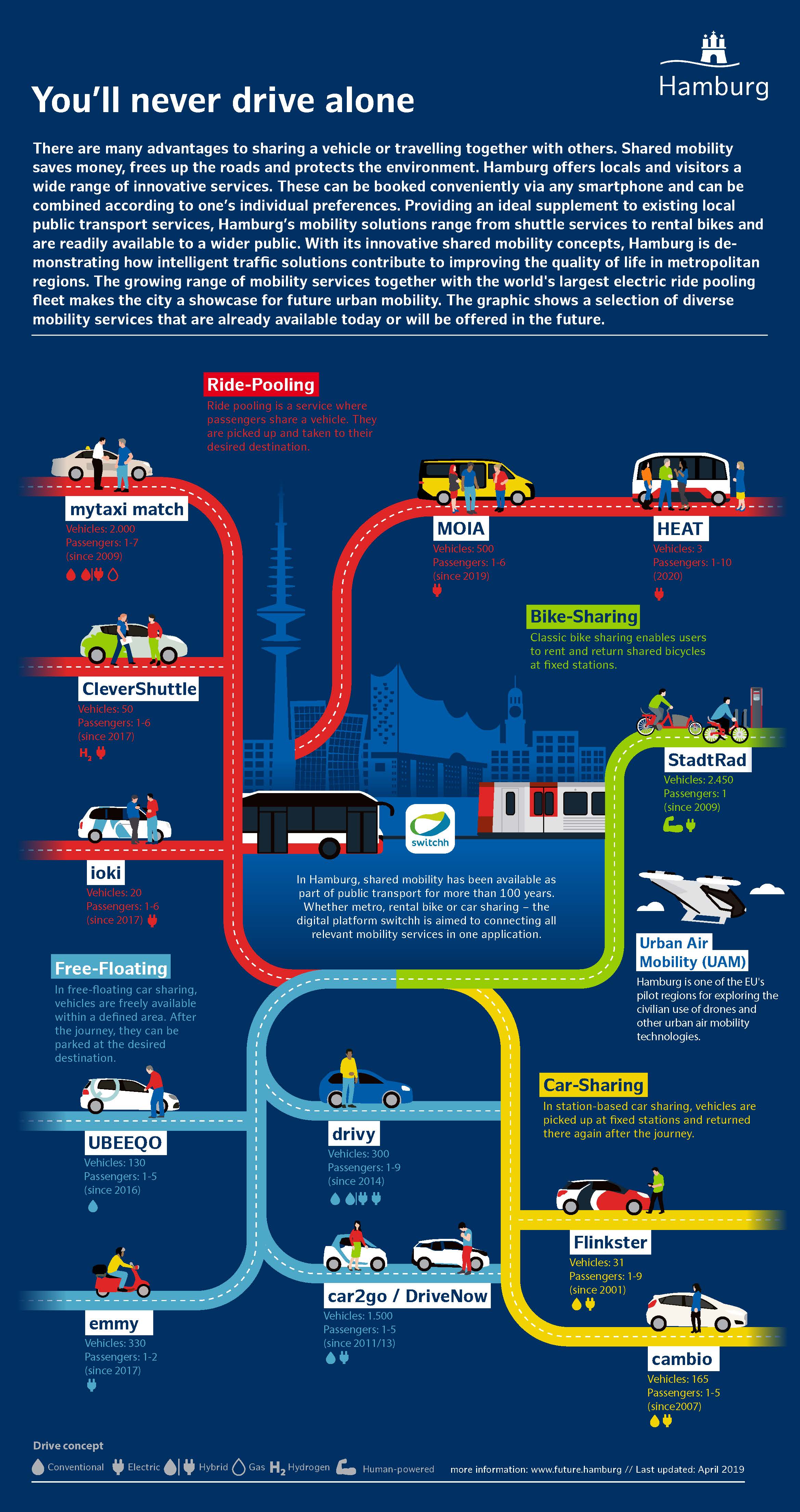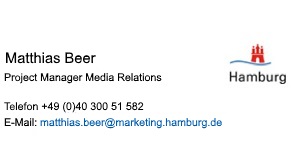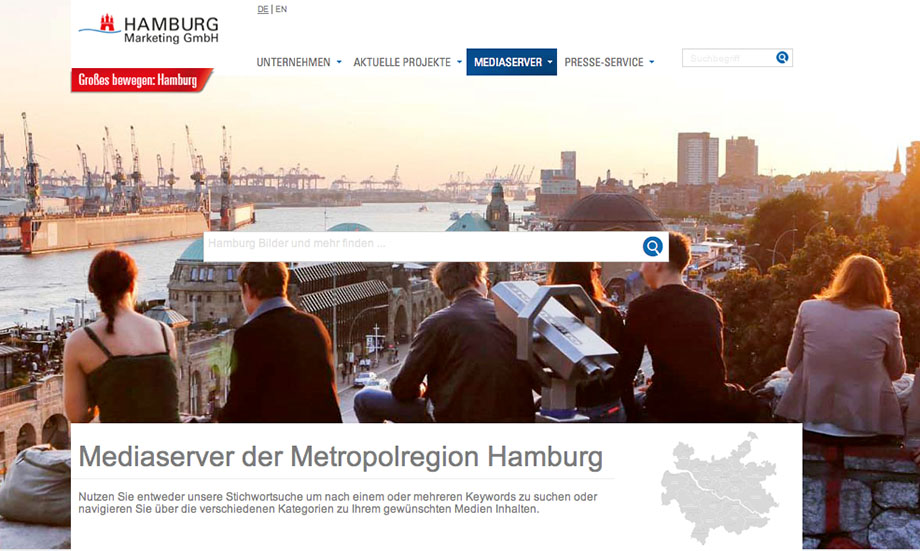You’ll never drive alone

Hamburg is assuming pole position in shared mobility
There are many advantages to sharing a vehicle or travelling together with others. Shared mobility saves money, frees up the roads and protects the environment. Hamburg offers locals and visitors a wide range of innovative services. These can be booked conveniently via any smartphone and can be combined according to one’s individual preferences. Providing an ideal supplement to existing local public transport services, Hamburg’s mobility solutions range from shuttle services to rental bikes and are readily available to a wider public. With its innovative shared mobility concepts, Hamburg is demonstrating how smart mobility enhances the quality of life in metropolitan regions, while at the same time protecting the environment.
In Hamburg, the majority of residents already have the key to the mobility of the future in their pockets – their mobile phone. More and more locals actually share vehicles or cover legs of their journey together. The easiest way to organise this is via an app. These digital helpers also provide an overview of the growing number of services available in the Hanseatic city. Hamburg is not only pioneering when it comes to the choice of mobility services available, but also aims to provide a useful interface between public local transport and private mobility services. Thus, the digital mobility platform switchh will soon integrate all relevant private and public mobility services in Hamburg in one app.

Car sharing strengthens electric mobility
In 2011, Hamburg was the first European metropolitan region for car2go, Daimler’s car sharing service. In the summer of 2018, more than 200,000 customers were already using this service in Germany's second biggest city. Today, the two largest suppliers, car2go and DriveNow, backed by the automobile groups Daimler and BMW, supply more than 1,500 vehicles across Hamburg. And the two automotive giants are planning to make their vehicles jointly available under the umbrella brand of SHARE NOW, a new joint venture. Based on the free-floating principle, vehicles can be located and booked on demand via an app. After their journey, users can park the vehicle in an allocated area, allowing the next customer to use the vehicle conveniently. In close cooperation with the City of Hamburg, BMW and Daimler intend to electrify their car sharing fleets by the end of 2019, providing either purely electric vehicles or cars with plug-in hybrid drives.
Improvements in environmental performance
Today, an increasing number of other suppliers such as Cambio, Flinkster, Greenwheels and Ubeeqo are also using vehicles with alternative drive technologies. In doing so, they contribute to improving the environmental balance of car sharing systems even further. A car sharing vehicle replaces four to eight private cars on average, and car sharing also promotes the use of bicycles as well as local public transport. As many of the customers have chosen not to own a car, the amount of space used for parking is reduced, alleviating the burden on roads in residential areas in particular. In addition, faster vehicle replacement in car sharing means that emission-free drives can be introduced at a swifter rate. In Hamburg, the number of electric cars is increasing rapidly as a result of continued growth in the car sharing market. The fact that Hamburg has one of the densest charging infrastructures of Europe’s metropolitan regions is certainly a bonus.
A smart way of travelling
In addition to purely electric drives, Hamburg is now also home to one of the world’s largest connected fleet of emission-free fuel cell vehicles. In autumn 2017, the Japanese car manufacturer Toyota delivered 20 Mirai fuel cell cars to the CleverShuttle electric driving service that are now chauffeuring customers around Hamburg's streets alongside other electric vehicles. The Mirai vehicle is a limousine manufactured in serial production and fuelled by hydrogen, which is converted into electricity via a fuel cell, thus powering an electric engine. Thanks to this process, the Mirai is thought to be faster to refuel than conventional electric vehicles and also provides an extended reach of up to 500 kilometres. In addition, the Hamburg Metropolitan Region is currently working hard on establishing processes with which hydrogen can be produced in an eco-friendly and economical way from excess wind power.
Taxis are also playing their part
The German mobility service provider CleverShuttle sees itself as a ride pooling service: customers can book trips using a smartphone app and then be picked up at a desired location. Through ride pooling, i.e. the pooling of passengers with the same route, CleverShuttle aims to reduce costs and thus offer prices that are up to 40 percent lower than local taxi prices, depending on the time and route. And of course these efforts didn’t go unnoticed by the taxi industry – with the result that Hamburg-based market leader mytaxi has also launched mytaximatch, an innovative service in the very same business segment. With mytaximatch, passengers can order a cab via an app and share the journey with other passengers, where possible. This cuts down on costs for all customers and helps maximise the utilisation of vehicles. Mytaxi is also part of the new mobility joint venture of BMW and Daimler and will soon be operated under the FREE NOW brand. In addition to the new drive technologies, it is precisely these innovative mobility concepts that contribute to improving the city’s ecological balance sheet.
Mobility at your fingertips
In Hamburg, Deutsche Bahn is currently testing how transport services booked via an app can enhance the attractiveness of services. As part of this project, Deutsche Bahn rolled out around 20 electric on-demand mini buses in mid-2018. Launched in cooperation with the municipality, these shuttle buses collect commuters from their residential areas and transport them to a public transport hub.
Moreover, in April 2019 the transport service MOIA commenced operations in Hamburg. Again, the ride pooling concept enables people with a similar route to share an eco-friendly shuttle ride. MOIA, a brand of the Volkswagen Group, developed a new electric vehicle specifically for this purpose. Passengers can benefit from a close-knit network of virtual stops to be picked up from, all available via an app.
Innovative biking schemes
With its StadtRAD Hamburg rental system, Deutsche Bahn demonstrated early on that shared mobility solutions can be used to complement public transport. Today, the red rental bikes have become an indispensable part of city life. Residents and visitors can choose from 2,600 bicycles at 220 stations, and the service is currently being expanded to include as many as 350 stations and 4,500 bikes. The scheme is particularly attractive as the first 30 minutes are free of charge and Hamburg’s transport network is being improved continuously to accommodate cyclists to an even greater extent. Against this background, private bike rental services such as nextBike and Donkey Republic have become increasingly attractive, especially for longer tours. For all those who love two-wheeled mobility but don't like the pedalling part, scooter sharing is a real alternative. E-scooters can be rented using an app, e.g. Emmy, which is similar to the free-floating services operated by BMW and Daimler.
The diverse range of mobility options does not only accelerate the traffic revolution in Hamburg, but also creates a tangible experience for everyone involved. By integrating these concepts into the local public transport system, Hamburg is already demonstrating today how mobility systems of the future can improve life in metropolitan regions.



